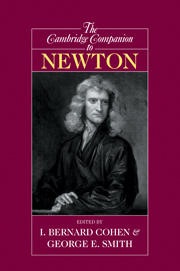Book contents
- Frontmatter
- Introduction
- 1 Newton's philosophical analysis of space and time
- 2 Newton's concepts of force and mass, with notes on the Laws of Motion
- 3 Curvature in Newton's dynamics
- 4 The methodology of the Principia
- 5 Newton's argument for universal gravitation
- 6 Newton and celestial mechanics
- 7 Newton's optics and atomism
- 8 Newton's metaphysics
- 9 Analysis and synthesis in Newton's mathematical work
- 10 Newton, active powers, and the mechanical philosophy
- 11 The background to Newton's chymistry
- 12 Newton's alchemy
- 13 Newton on prophecy and the Apocalypse
- 14 Newton and eighteenth-century Christianity
- 15 Newton versus Leibniz: from geometry to metaphysics
- 16 Newton and the Leibniz-Clarke correspondence
- Bibliography
- Index
15 - Newton versus Leibniz: from geometry to metaphysics
Published online by Cambridge University Press: 28 May 2006
- Frontmatter
- Introduction
- 1 Newton's philosophical analysis of space and time
- 2 Newton's concepts of force and mass, with notes on the Laws of Motion
- 3 Curvature in Newton's dynamics
- 4 The methodology of the Principia
- 5 Newton's argument for universal gravitation
- 6 Newton and celestial mechanics
- 7 Newton's optics and atomism
- 8 Newton's metaphysics
- 9 Analysis and synthesis in Newton's mathematical work
- 10 Newton, active powers, and the mechanical philosophy
- 11 The background to Newton's chymistry
- 12 Newton's alchemy
- 13 Newton on prophecy and the Apocalypse
- 14 Newton and eighteenth-century Christianity
- 15 Newton versus Leibniz: from geometry to metaphysics
- 16 Newton and the Leibniz-Clarke correspondence
- Bibliography
- Index
Summary
In the course of a long life Isaac Newton made many enemies: Francis Linus (or Hall), Robert Hooke, John Flamsteed, Gottfried Wilhelm Leibniz, Johann I Bernoulli. Of these Leibniz was by far the greatest intellect and above all an outstanding mathematician and philosopher. Newton defeated them all and outlived them all except the last, twenty-five years his junior.
It was a sad chronology that brought two such inventive mathematicians as Newton and Leibniz to live in the same age; never were temperaments and intellectual characters more at odds. Almost the only feature that they had in common was Protestant piety, yet even in appealing to God the Creator they could not agree. In mathematics and its applications to celestial mechanics, and more particularly in the development of the calculus, though the methods promulgated by the two men were equivalent, they had been reached and were justified by wholly distinct arguments. Newton was by choice a geometer, Leibniz an algebraist; the difference does not of course imply that they could not tackle the same problems. J. E. Hofmann has written that Leibniz’s “first major [mathematical] discovery in Paris [in 1673] originated in thoughts strongly influenced by considerations of logic and philosophy – and as so often with Leibniz, was not fully established but came as the fruit of a particular insight observed in simple examples and generalised by a stroke of genius.”
- Type
- Chapter
- Information
- The Cambridge Companion to Newton , pp. 431 - 454Publisher: Cambridge University PressPrint publication year: 2002
- 4
- Cited by



